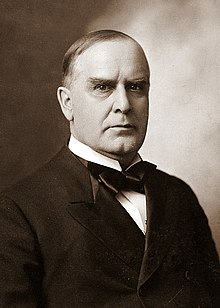📖 Presidential Profile
Comprehensive overview of leadership, policies, and historical significance
📋 Biography & Political Journey
The Architect of American Prosperity
William McKinley entered the presidency during a period of economic depression and social unrest, but his administration would oversee a remarkable transformation of American economic fortunes. His presidential campaign of 1896 against William Jennings Bryan represented a fundamental choice between different economic philosophies, with McKinley championing industrial growth and protective tariffs against Bryan’s populist silver standard.
McKinley’s economic policies, particularly the Dingley Tariff of 1897, helped stimulate American manufacturing and contributed to the end of the economic depression that had plagued the nation since 1893. His administration presided over a period of unprecedented industrial expansion, with American steel production surpassing that of Great Britain for the first time.
The Spanish-American War and Imperial Expansion
The defining moment of McKinley’s presidency came with the Spanish-American War of 1898. Initially reluctant to pursue military action, McKinley was ultimately swayed by public opinion following the explosion of the USS Maine in Havana Harbor. The conflict, which Secretary of State John Hay called a “splendid little war,” lasted only four months but had profound consequences for American foreign policy.
The war’s aftermath saw America acquire Puerto Rico, Guam, and the Philippines, marking the nation’s emergence as a colonial power. McKinley struggled with the decision regarding the Philippines, later claiming that divine guidance led him to conclude that America must “uplift and civilize and Christianize” the Filipino people, despite many already being Christian.
Domestic Policy and Economic Leadership
McKinley’s domestic agenda focused on promoting American business interests and industrial growth. The Gold Standard Act of 1900 officially established gold as the sole standard for redeeming paper money, ending the monetary debates that had dominated American politics throughout the 1890s. This decision provided the economic stability that businesses needed for expansion.
His administration also saw significant infrastructure development, including support for the construction of transcontinental transportation networks. McKinley believed that American prosperity depended on the ability to move goods efficiently across the continent and to overseas markets. “Our capacity to produce has developed so enormously and our products have so multiplied that the problem of more markets requires our urgent and immediate attention,” he declared.
The Philippine-American War Controversy
McKinley’s decision to retain the Philippines following the Spanish-American War led to the Philippine-American War (1899-1902), a brutal conflict that cost thousands of American and Filipino lives. Critics argued that American colonial policies contradicted the nation’s founding principles of self-determination and democracy.
The war featured controversial tactics, including the use of reconcentration camps and water torture, which drew comparisons to Spanish methods in Cuba that had originally prompted American intervention. Anti-imperialists like Mark Twain and Andrew Carnegie condemned these policies, arguing that America had abandoned its moral leadership in pursuit of empire.
The Carnation and Presidential Superstitions
McKinley was known for his superstitious attachment to red carnations, which he wore as a good luck charm in his lapel. He believed the flowers brought him political fortune and rarely appeared in public without one. During public appearances, he would often give away his carnation to children or admirers, considering it a gesture of shared good fortune.
On September 6, 1901, at the Pan-American Exposition in Buffalo, McKinley gave away his lucky carnation to a young girl just minutes before being shot by anarchist Leon Czolgosz. The irony was not lost on the public, and many wondered whether giving away his talisman had somehow sealed his fate. McKinley lingered for eight days before succumbing to his wounds, reportedly asking about his assailant’s welfare and requesting that no harm come to him.
Humor & Jokes
McKinley's Prosperity
Under McKinley, America prospered economically. Finally, a president who was good for business and didn't…
Read More →Greatest Wins
🌏 Open Door Policy with China
A diplomatic masterstroke that established America as a major Pacific power while promoting free trade…
Read More →Epic Fails
⚖️ Failure to Protect African American Civil Rights
McKinley largely ignored the rising tide of lynchings and Jim Crow laws, abandoning federal protection…
Read More →